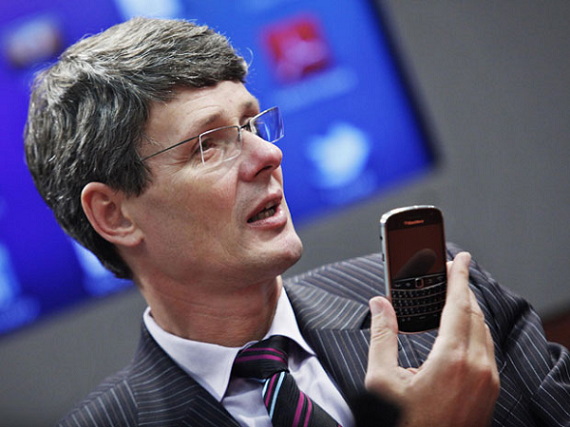
As we reported this weekend, the proposed $9 a share offer that BlackBerry accepted from a consortium led by Fairfax Financial Holdings last month, which would have amounted to a $4.7 billion buyout, was in trouble. Fairfax, it seemed, was having trouble finding banks willing to put up the money.
And now the deal is dead. In fact, BlackBerry has completely taken itself off the market and is shaking up its executive ranks as well.
Rather than buying the company, Fairfax along with a group of other investors, will instead be putting $1 billion into BlackBerry, it was announced on Monday.
The investors will be will paying $10 a share, nearly 30% higher than the company’s closing stock price on Friday. Of the $1 billion, $250 million will be coming from Fairfax itself. The deal is expected to close in the next two weeks, and once it does, the company will be getting a new CEO.
The man currently occupying the job, Thorsten Heins, will resign from the position, as well as from the company’s board of directors. Heins will be replaced, at least temporarily, by former Sybase CEO Jon Chen, who will also be appointed as the Executive Chair of BlackBerry’s board of directors.
Under his new roles, Chen will be responsible for the “strategic direction, strategic relationships and organizational goals of BlackBerry.”
In addition to this news, it was also announced that Prem Watsa, Chairman and CEO of Fairfax, will be appointed Lead Director and Chair of the Compensation, and David Kerr will also be resigning from the board of directors.
Thorsten Heins became the CEO of Research in Motion (now BlackBerry) after the company’s co-CEOs, Jim Balsillie and Mike Lazaridis, stepped down on January 23rd, 2012.
This news marks the end of the company’s “strategic review,” it said, which began back in August.
In addition to Fairfax, there were a number of parties that were reported to have been interested in buying the company. They included Canada Pension Plan Investment Board, Bain Capital, and Chinese smartphone and computer maker Lenovo Group. Earlier this month, reports surfaced that Google, SAP and Cisco were also interested.
An SEC document also showed that Mike Lazaridis and Doug Fregin were perhaps interested in buying back the company that they started.
It was also reported last week that Facebook and BlackBerry had met to discuss a potential buyout, though there was no indication that Facebook was actually interested in bidding.
BlackBerry’s uncertain future
So where does this leave BlackBerry? The company wanted to sell itself, but couldn’t find anyone who was willing to bite. That says a lot about how far BlackBerry has fallen from its once prominent position in the smartphone world.
But what else is a struggling company to do than try to put the best light on a difficult situation?
“Today’s announcement represents a significant vote of confidence in BlackBerry and its future by this group of preeminent, long-term investors,” Barbara Stymiest, Chair of BlackBerry’s Board, said in a statement.
“The BlackBerry Board conducted a thorough review of strategic alternatives and pursued the course of action that it concluded is in the best interests of BlackBerry and its constituents, including its shareholders. This financing provides an immediate cash injection on terms favorable to BlackBerry, enhancing our substantial cash position. Some of the most important customers in the world rely on BlackBerry and we are implementing the changes necessary to strengthen the company and ensure we remain a strong and innovative partner for their needs.”
Comments like that cannot mask the fact that the once-dominant smartphone maker has been seeing dismal sales recently, however.
In its second quarter earnings in September, BlackBerry revealed in September that it generated just $1.6 billion in revenue for the quarter. Analysts, meanwhile, were expecting about twice that—or $3.06 billion.
The cause of BlackBerry’s horrific second quarter: extremely low Z10 sales. All told, the company sold 5.9 million BlackBerry phones in the second quarter, but it only expects to recognize hardware revenue on 3.7 million phones.
By comparison, the company sold 6.8 million phones and generated $3.1 billion in revenue in Q1 2014.
Bringing in Chen as the interim, and possibly long-term, CEO might help give the company a new direction. But the company is going to have to see a dramatic reversal of fortune if it wants to survive much longer.
Another troubling sign for BlackBerry: shares are cratering following this announcement. They are currently down 13.13%, or $1.02 to $6.75 a share.
(Image source: http://www.cantechletter.com)















